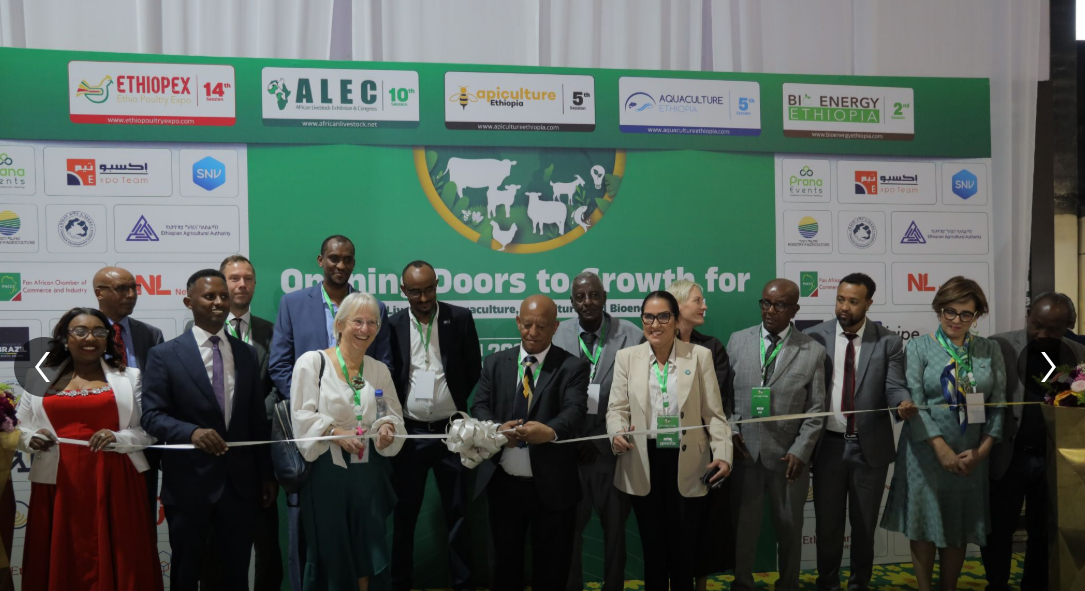The 14th Ethio Poultry Expo, held from October 30 to November 1, 2025, at the Millennium Hall in Addis Ababa, marked a major milestone in Africa’s journey toward modernizing its poultry and livestock industry. The three-day exhibition attracted over 120 exhibitors and participants from 18 countries, transforming the Ethiopian capital into a hub of innovation, investment, and partnership. The expo was designed not only to promote animal husbandry but also to highlight Ethiopia’s growing ambition to become a leading player in poultry production within the region.
Organized under the theme of advancing livestock development through innovation, the event provided a unique platform for farmers, investors, researchers, and agribusiness companies to share knowledge and explore the latest technologies in poultry, livestock, aquaculture, and animal feed. Experts showcased modern farming techniques, feed production systems, vaccines, and breeding technologies that aim to improve productivity and quality across the value chain.
Speaking during the opening ceremony, Alemayehu Mekonnen, Senior Adviser to the State Minister of Agriculture for Fisheries and Livestock, emphasized that Ethiopia’s poultry sector remains underdeveloped compared to its potential. Despite the country being home to over 59 million chickens, most of them — approximately 54 million — are indigenous breeds characterized by low productivity. Mekonnen noted that modernizing the sector is critical for boosting food security, creating jobs, and strengthening rural livelihoods. He also highlighted that Ethiopia’s per capita consumption of poultry products remains below global averages, showing the need for policy support and private-sector investment.
Currently, Ethiopia’s poultry farmers face several challenges, including limited access to quality feed, inadequate veterinary services, poor infrastructure, and high disease prevalence. However, the Ethio Poultry Expo served as a turning point by exposing local farmers and entrepreneurs to innovative practices and equipment from global industry leaders. Countries such as China, Germany, France, Kenya, Tanzania, and the Czech Republic participated, bringing a wealth of knowledge and showcasing products ranging from modern hatchery systems to digital livestock management tools.
The Ethiopian government has also placed animal husbandry at the center of its ten-year agricultural transformation plan. The goal is to double poultry meat production from 48 tons in 2020 to 106 tons by 2030 and increase egg output from 2.8 billion to over 5.5 billion units within the same period. The share of chicken meat in the national diet is expected to rise from 5 percent to 30 percent by 2030. This ambitious roadmap aligns with the expo’s mission of transforming poultry from a smallholder livelihood activity into a commercial and export-oriented enterprise.
Beyond the poultry segment, the expo also featured related events — the 10th African Livestock Exhibition and Congress (ALEC), the Apiculture and Aquaculture Ethiopia trade show, and the 2nd Bio-Energy Trade Show. Together, these parallel exhibitions underscored the interconnected nature of agriculture, energy, and food production. They also reflected Ethiopia’s broader strategy to integrate animal farming with sustainable energy and environmental management.
The Expo’s Broader Impact
The Ethio Poultry Expo has had far-reaching impacts across multiple fronts. It boosted investor confidence in Ethiopia’s agricultural potential, encouraged technology transfer, and enhanced collaboration between local and international agribusiness players. The event also created opportunities for small and medium-sized enterprises (SMEs) to connect with large-scale investors and access financing for modernizing their production systems.
Socially, the expo’s focus on modern poultry production has the potential to improve nutrition by increasing access to affordable protein sources, such as eggs and chicken meat, which remain vital for combating malnutrition in many communities. Economically, it contributes to rural job creation, women’s empowerment, and youth employment in farming, processing, and distribution.
Overall, the 14th Ethio Poultry Expo was not just an exhibition but a powerful statement of intent. It signaled Ethiopia’s readiness to take bold steps toward agricultural transformation. By merging local expertise with global innovation, the event reinforced the vision of a vibrant, self-reliant, and sustainable poultry industry that can feed the nation, empower farmers, and drive inclusive economic growth across Africa.



